Some games I played in
2012
(books)
Tarzan of the Apes |
by Edgar Rice Burroughs Mar |

A fun, easy read, if rather shaky. Seeing the jungle through the eyes of Tarzan's parents, and then seeing it through his eyes and those of the other apes makes a great contrast. Tarzan's view of the world is just plain charming, and interpreting the letters of a book as "black bugs" seemed like a really inventive and animal-like way of reading the concept. The story dips a bit once the other humans are involved - their side of the story just isn't that interesting unless Tarzan's around, and their hideously long-winded dialogue gets tiresome real fast.
Honest to god, I'm going to sound like Codiekitty here, but I wanted to strangle the bumbling professor if it kept his mouth shut - he's a stock character that's easy to write and is done well in a lot of media, but here his absent-mindedness and penchant for waffling just got on my nerves. Things improve when Tarzan hangs out with the French navyman, but the 'climax' didn't do much for me. What fun is there taking the ape-man out of the jungle if he's no longer an ape-man?
I suppose I was mostly in it for the animals' view of the world and their culture. Tarzan coming to terms with being a human was interesting, but actually giving him human chums to hang out with just didn't really intrigue me. Seeing the naive, primal view of human inventions and concepts was the real meat, and combined with the rather straightforward style of writing... I'm not competent enough to accurately describe what it achieved, but it just made for entertaining reading.
I did try The Return of Tarzan the following month, but I gave it up after a couple of chapters. As much as the narration harkened back to what a bold man of the jungle he was, Tarzan just seemed like a big lug on a boat. I ask again, why take the ape-man out of the jungle?
A random remark: Esmeralda, Jane's maid, is first described as "big", and for whatever reason that give me the image of a tall, statuesque, amazonian native woman. Turns out when it meant "big", it meant chubby "mammy" figure who serves as the embarrassingly stupid comic relief - just one of the book's many instances of treating black characters with no respect. Oy.
The Stars My Destination |
by Alfred Bester Apr |
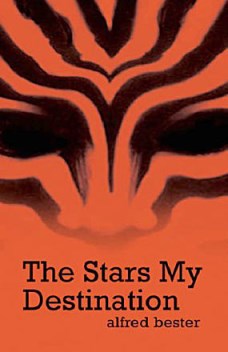
A revenge story of a guttermouth trapped in space and passed by for rescue by another ship, setting him into a rage, setting out to do what he can to enact his vengeance upon it. It's very powerfully written, and the action and flow of the adventure makes it read out like a movie, practically.
One of my personal pet peeves for a lot of science fiction stories is that they seem like mere procedure, an outlet the author has to churn out just so they can spend pages and pages gushing over their far-out ideas.
The story of The Stars My Destination is wholly character-driven: Gully's quest for revenge, the bad guys' desire for PryE, and so on. But it still introduces some really wild, spectacular sci-fi concepts, some vital to the nature of its setting, and some just for flavour. The book doesn't stop to give you a painfully in-depth look into the world and how it works - hey, did you know human beings had the power to teleport all along? Good, let's keep moving. Keeping the pace active makes me more curious about these elements, rather than grinding to a halt to explain all.
The story throws in more and more elements, and goes in some really bizarre directions by the end of it, turning Gully from a despicable bum to an almost noble, time-and-space travelling, repenting figure - but I loved it. It's a unique adventure, and just a strong book.
Paycheck |
by Philip K. Dick Apr |

A collection of short stories by Philip K Dick. A satisfying compilation of science fiction, all of them boasting very unique concepts, though some clearly had more love put into them than others. Good read.
PAYCHECK
Having taken a job as a repairman in a factory, a worker wakes up two years later with no memory of his work, no pay, and the police after him. It's an alright story. There are no awe-inspiring themes, no engaging characters, no incredible plot - just an alright story. A fair enough page turner. The sort of perfectly safe and uneventful sci-fi that makes for easy conversion to film blockbuster.
NANNY
Parents hardly have to look after their children thanks to robot nannies, but market competitiveness forces strange behaviour upon the machines. The atmosphere really sells this one - the talk of the nanny's duties has a real Mary Poppins vibe about it. The story effectively boils down to a jab at the competitive market and manufactured redundancy, but it carries itself pretty well. Decent page turner and a great atmosphere, but not as memorable as some of the others.
JON'S WORLD
Two time travellers observe a war their planet has just barely survived, and try to find a way of altering it. Like Paycheck, it came across as rather straightforward - there's some intriguing world-building and concepts, but nothing that really wowed me. Some of the examination of time travel, causality and the ramifications of butting your way into the past does make for interesting discussion, and I won't deny I was interested to see how it would end, but it didn't really click with me.
BREAKFAST AT TWILIGHT
An ordinary family find their house blasted into the future, where the world has been ravaged by war, radiation, and propaganda. A very powerful story - what is life when war is all there is? It's a bleak look at a world where life is no longer to be lived, but to be "won". The Russians just systematically destroying the continent is a genuinely spooky concept: it's not enough to defeat an enemy, you've got to erase them. And given the state of the land they had arrived in, any further action would've been overkill. The family make it back to their own time, but the ending is very chilling. Definitely a top-notch story.
SMALL TOWN
A put-upon middle-aged man with a model recreation of his town has enough of his life, and begins to design a new dream town for himself. Most of the stories have some degree of sci-fi going on, with all kinds of weird concepts and whatnot, but this one, presenting itself in regular everyday life, feels particularly weird when there's no sci-fi at all. It comes across like an episode of The Twilight Zone - and that's not a bad thing! An intriguing little story that really builds up, though the ending was a bit lacklustre. Oh no, he has the police at his command! Given the other stories in here, that hardly gives me the willies.
THE FATHER-THING
An eight year old boy hears his father talking to himself in the garage, and when his father returns to the house, it's no longer the man he knew. Reminded me a little of Stephen King's It, at least in the bare-basic premise of neighbourhood kids standing up to a strange, monstrous threat. Another great spooky one, and gave me a hint of Goosebumps, had they any trace of quality (ohhh). It feels like it could've gone on for longer, or at least have a victory that wasn't so easy, but definitely an engaging and memorable one. Precisely the sort of story I almost wish I'd read as a kid, though it's probably for the best I didn't.
THE CHROMIUM FENCE
A distant future with advanced technology, and the two political sides are for "purifying" your hygiene, or for keeping your natural sweat glands and wonky teeth... and people are killing others for their cause. The first of the stories I read. Bleakly fascinating, and the contrast was great - a world where even the transport from work comes across as whimsical, yet humans are now getting caught up in even pettier arguments. A world where there's no escape from these arguments; anyone who doesn't fit the current elected agenda is terminated or 'reprogrammed'. Great one.
AUTOFAC
A world that's survived the ravages of war, but automated supply factories are still in operation, and slowly stripping the world of what little resources it has. Although on a slightly grander scale than some of the other short stories (it's split into four acts!), this one just didn't really grab me. It's got some terrific imagery and the setting is probably one of the most fascinating in the compilation, but... I don't know, the actual story itself just didn't get me invested.
THE DAYS OF PERKY PAT
A ravaged future where radiation has obliterated the majority of the population; the children scavenge and hunt on the surface, while the adults' lives revolve around games of "Perky Pat", a game of creating a life and environment for teenage plastic dolls. A curious tale of materialism and one-track-minded hobbyism in a world of danger and survival. It has an interesting proposition that the players are only as mature as the game - another tribe's variant on the game is of a grown woman and a married life, and the main tribe are frightened and intimidated by the concept. An oddball story with some interesting insight into the lives of these survivors, though not a gripping one.
STAND-BY
The universe is run by a supercomputer president, but when a malfunction occurs, the human stand-in has to fill in and make the big decisions on his own. It paints an intriguing picture of the spacey world, but it's a bit limited since the whole thing is politics. There's an amusing light-heartedness to it, like the political commentator clown, though the humour mostly boils down to "lol, fat people". Pretty ordinary story; the ending is the best bit about it, but one wonders if it could have been explored any further.
A LITTLE SOMETHING FOR US TEMPUNAUTS
The first three American time travellers end up caught in a "closed time loop", and relive the days surrounding their memorial over and over again. An interesting one, but it took me a while to wrap my head around it, and even then I'm not quite sure. The basic idea of the three getting worn down and genuinely exhausted of reliving the same moments, especially being briefed by the heartless officials, is pretty relatable. Intriguing, but takes a while to warm up.
THE PRE-PERSONS
Overpopulation threatens the world's supplies, and the government have chosen to rectify it with "abortion vans" - children under 12 can be whisked away and exterminated at the whim of the parents. A very strong and powerful story - there are some in the compilation where it feels like Philip is just churning it out because he got an idea and he might as well finish it. This one positively beams with his passionate opinion on the subject, and it's one of the best in the lot. The government claims destroying under-12s is fine because they have no soul, and the characters vigorously argue the ins and outs of the claim, while we explore the strange new society. The industry is taken down at the end, but it's a still a melancholy victory for the 'heroes'. A tough one to discuss in-depth because, well, the real deal is such a heated topic. Definitely among the best in the lot.
Danse Macabre |
by Stephen King Jun |

Stephen King talks about horror media, and all the subjects and topics surrounding it.
... I'll be frank, I can't remember this one all too well! I spent a whole dang month reading it, too. It was a fair read with a number of interesting points. A lot of the political points didn't gel with me, but I'm a fussy bitch. I'm sure if I were properly researching horror media rather than reading to fill time 'til I found my next book, this would've left more of an impression!
Caution Man; Safety Knight |
by Martin Skarzynski (webcomic) Jul |
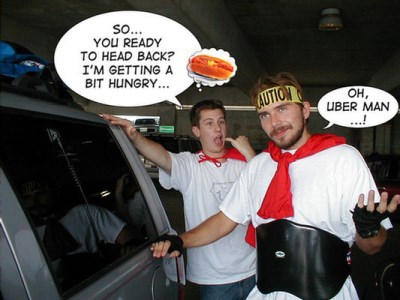
A superhero webcomic from 2002, its claim to fame being its usage of photos and live-action "actors", in lieu of drawn artwork. It's an intriguing gimmick, to say the least!
It contains a fairly simple premise - Caution Man, a dorky superhero with the power of safety, protects the city from evil with his similarly dweeby superhero buddies, while a group of supervillains (of varying levels of incompetence) attempt to put him out of commission. It's all played for dumb laughs, though by the fourth episode bigger events begin to take place behind the scenes, including a supervillain power struggle, a clone of Caution Man, and a strange prophecy revolving around him and his untapped powers. However, the series drops off before it can go anywhere, ending unfinished in the middle of episode 6.
The comics are pretty basic fun, full of mild action and stupid jokes, appropriate for all ages. The growing plot and deluge of mystery seems like an attempt to give it more depth than just an ordinary superhero comedy strip, but since it doesn't go anywhere (and the author hasn't dropped any details on what exactly would've happened), it comes across as a bit of a bummer.
The "fully live-action webcomic" approach is really unique and gives the comic a lot of identity. Seeing superhero antics approached with little to no budget is amusing, and even though the characters aren't exactly deep or well-rounded, having them performed by actual human beings adds a certain charm to it. There's great little expressions and mannerisms you'd rarely find in most comic artwork.
Pacing is a bit of an issue, though. The issues are presented as sequential images in a photo viewer, with no page to lay panels on. As such, it seems there was no "guideline" on how long a scene or an episode should be. Dialogue has a tendency to run on for longer than necessary; it's a suitable excuse to sneak more gags or exposition in, but some times, especially during the villain conferences, I'm muttering to myself, "okay, I get it, what's next?" And that's perhaps the biggest problem in any unfinished work - it spends a sizeable amount of wordage apparently gearing up for a large, epic plot, but after five episodes you begin to wonder what exactly has happened so far.
It feel like a bit of a philistine lumping a webcomic in with literature, but hey, at least it's a decent webcomic! Caution Man; Safety Knight perhaps peters out a little too fast, but it's an amusing read while it lasts.
Further reading: Caution Man can be read at Bwish.com.
We Learn Nothing |
by Tim Kreider Aug |
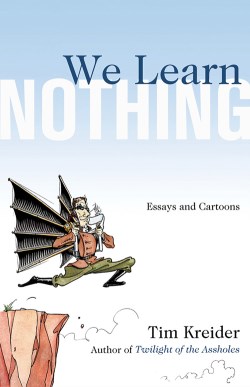
A series of thoughts, essays and cartoons from Tim Kreider, the creator of The Pain; When Will It End?
Given how charmingly cynical his comic is, it's a surprisingly sweet book. It covers several events and subjects, from his one-track-minded acquaintance with a political agenda, to a friend suffering a gender identity crisis, to reuniting with his biological family. The mood has its ups and downs, and some events he retells have no happy resolution, but the book has a strangely feel-good vibe about it; a very human feel to it. I guess after reading hokey fiction for so long, it's nice to read about events that don't play out to type.
... I swear I had more notes written out for this one, and I'm kicking myself for not having them. This was a very pleasing read, and a lot of the passages in it were stuck in my head for a long while. Recommended.
Ice Station |
by Matt Reilly Sep |
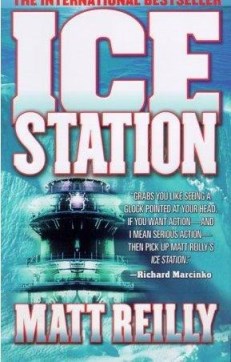
I picked this out of a pile of books we were getting rid of. The blurb looked good, but like a lot of books, I wasn't expecting it to be quite as enticing as it sounded. Goddamn, was I wrong! This was easily one of the most engaging books I'd read in a long, long time.
A chunk of prehistoric ice is unearthed from deep under the Antarctic, containing a huge black 'spaceship'. The scientists who discovered it are picked off by strange beasts, and the survivors are trapped in the research station. A squad of marines come to investigate, only to get more than they bargained for, having to fight every other national military squad under the sun, face betrayals from their superiors and their own team, and encounter all manner of conspiracies. America saves the day, of course.
It's an easy, fast-paced read, pretty much your usual high-octane violent action movie, in text form. When the action gets too intense, it settles down and instead chooses to build up some conspiracies... and when that gets too boggling, it roars back into action. It's not fine literature, but it kept me glued to it for hours on end. The first book in a long time it was hard to pull myself away from!
It's pretty grisly, though. There are dozens of brutal deaths and mutilations, from friend and foe, but then it's got things that stand out like a cute genius kid, a comic relief scientist, and an adorable baby fur seal. It's a bit jarring, to say the least, but it helps prevent the story from becoming all military, all the time.
My one beef is that the political, conspiracy side of things gets a bit tiresome. The whole story is basically America trying to claim a technological accomplishment for themselves and fighting off all the other countries who aim to snatch it, so of course every nationality on earth is going to be viewed as sneaky yellow-bellied bastards. And then when the ICG start playing their hand, now it's okay to start distrusting everyone and blowing them to shit, including wrecking an aircraft carrier that's just rescued them. Without so much as an apology! Then again, I've never been caught in an international conspiracy before, so maybe that's acceptable etiquette.
My unfounded hippie beefs aside, this was an excellent book, and one of the best reads of the year.
The Box: Uncanny Stories |
by Richard Matheson Oct |
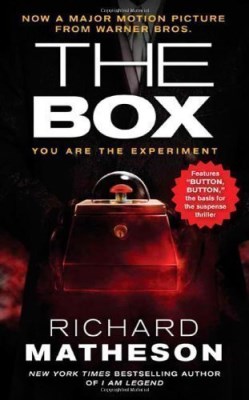
I was holding onto this until I returned it to my brother, but I figured I'd give it a quick spin.
Compared to Philip K. Dick's short stories, these felt really lacking. They're not terrible. but they lacked something to make them stand out. They felt like ghost stories more than anything; stories more entertaining to repeat the gist of it to others than to actually read it. Some stories were semi-decent, but the text lacked something to make it jump off the page (to sound like a pretentious English teacher). Some had fantastic writing, but suffered some other sort of crippling flaw. There's a couple of decent reads in it, but for the most part I think I was spoilt by Philip's works.
BUTTON, BUTTON
You should know this one. A couple receive a box; if they press the button they get fat stacks of cash, but a total stranger will die.
It's okay. The theme is interesting, but it's something that deserves to be explored in something more inquisitive or philosophical, rather than this dry prose. It ends up reading more like a campfire horror story more than anything. Maybe that's the appeal, who knows. The last line is the only worthwhile part of the text.
GIRL OF MY DREAMS
An abusive asshole is married to a woman who's plagued by prophetic dreams of how people die. He then uses these dreams to extort the victims-to-be for money, in exchange for clueing them in on cheating death. Another interesting concept. A more interesting read, even if it is just to hear the eventual details on how the asshole's going to snuff it.
DYING ROOM ONLY
A couple stop at a café in the middle of the desert. The man enters the bathroom, but never comes out. A fantastic atmosphere. Genuinely spooky. A real page turner. The best read of the entire book.
The problem? For all the rising suspicion, mystery and tension, there's nothing monstrous behind the guy's disappearance.
You know what it's about? It's about rednecks stealing people's wallets.
That's it.
That's the fucking ending.
I guess as a reverse-twist, it works, and it's a change to have a 'happy' ending since the two get reunited. But man, with creepy atmos' and a dumb title like that, it feels bloody shameful to have it applied to a half-baked detective story.
A FLOURISH OF STRUMPETS
Prostitutes go door to door. Forgettable.
NO SUCH THING AS A VAMPIRE
A small town gets terrified by a girl repeatedly suffering vampire bites in the night. The twist at the end is cute. The actual story did nothing for me.
MUTE
A house burns down, orphaning the child of two intelligent professors, and is taken in by foster parents. The child can't speak, but was actually part of an experiment to hone telepathic powers in children.
A strange one, but very intriguing, though. The real meat comes from the inner thoughts of the child, and how his telepathic mind interprets the world of sound and speech. Since he cannot speak, the child is seen as stupid, and it comes across as an allegory for mental illness or learning disabilities. Just because they can't project, that doesn't mean they aren't smart. The sequence with the monstrous teacher really drives that nail in.
Outside of that aspect meaning a lot to me, it's another story with an intriguing concept but otherwise not terribly memorable. An engaging read with a bittersweet ending, but not one that'll stick in my head.
THE CREEPING TERROR
Los Angeles is alive... at a viral level. It spreads across the land, infecting the environment and the populace, creating terror across the United States. A silly, funny little read.
SHOCK WAVE
A church organist is distraught at the news that the church's eighty year old organ is being prepared to be thrown out. He believes it has a mind of its own, and it isn't happy about this news either. A fair enough read with intriguing atmosphere; it's ambiguous if the organ is actually alive or not, which is a neat little oddity.
CLOTHES MAKE THE MAN
A business man functions best with a smart set of clothes, until he literally can't function without them. A short, amusing story, even if you can see the ending from a mile away.
THE JAZZ MACHINE
A jazz musician is approached by a man who claims to have a machine that can "translate" jazz music. An engaging little story with some nice writing - it's formatted like a song or poem, which combined with the dialogue really helps carry the atmosphere. A decent read.
T'IS THE SEASON TO BE JELLY
Christmas with a family of heavily-mutated, post-apocalyptic humans. Strange; not much actually happens, and what does happen is a pain to read with the phonetic accents. Felt like filler, to be honest.
Flight From Deathrow |
by Harry Hill October |
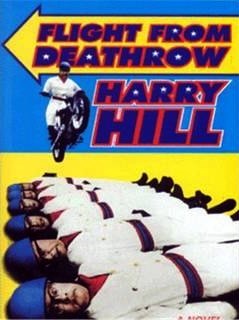
A novel by television funnyman and host of TV Burp, Shark-Infested Custard and other oddities: Harry Hill! My brother tried to read this years ago, and I had tried the first few pages, but the convoluted non-linearity threw us for a loop and we both gave it up rather promptly. I thought I'd give it another bash, if just to get rid of it.
So, what's it about? Well, uh... it's an oddball book, isn't it? I mean, what else would you expect from Harry Hill?
Admittedly, it's a tough book to begin reading, as it's hard to know what to expect. There's no clean narrative - you're lucky if two paragraphs of each chapter actually progress the 'story'. It'll take every opportunity it gets to change topic and go on a rambling tangent... and sometimes it won't bother with the opportunity and just go on an unrelated vignette anyway.
And then it'll unexpectedly leap back to where it was before it trailed off. Only to do it again.
Once you accept there's not going to be a comprehensible narrative, it's an amusing ride just to see what odd directions it trails off in next. My only advice is just try and read it quickly, that way every minute detail it references will stay fresh in your head. You'll miss out on a fat stacks of callback jokes otherwise.
The titular flight from Heathrow (the first page apologises for the typo) isn't even the primary plot. It skips around everywhere, from an elderly politician looking to marry a parrot; men planning to escape a mobile prison by building a visitor's centre; a feud between artificial foot manufacturers; pygmies living underground with Prince Harry; Jonathan Ross seeking to revive a coma patient, and more. As you'd expect, it's all nonsense.
It's an entertaining read with lots of truly zany ideas; some of the concepts are explored in amusing detail, while some are left to your imagination. It has a different feel from Harry's TV work, but, well, that's to be expected when you're reading a bloody book. Celebrities from 1980s British pop culture show up everywhere, many of whom escape my knowledge. Given their eccentric and out-of-place roles, knowing them isn't exactly mandatory, but I imagine anyone reading this from outside the UK would be a bit lost. Is Harry Hill even known outside of Britain, for that matter?
It's an enjoyable read with plenty of memorable moments, but the uncontrolled narrative was a bit of a drag - some plots were entertaining, and some just had to be tolerated.
Bumblebee & Me: Life as a G1 Transformer |
by Dan Gilvezan (audiobook) Oct |
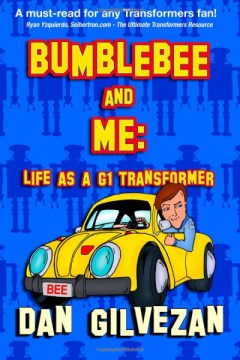
Haha, now this is fine literature. I saw mention of it on the Transformers Wiki, and the eighty minute audiobook cost near-nothin' on Audible.com, so I picked it up.
Dan Gilvezan, voice actor of the loveable Volkswagen Bumblebee (and others!) from the G1 cartoon, recaps and reminisces his time working on the show from 1984 through 1987.
It's a quaint little listen, and hearing Gilvezan himself talk about his memories and anecdotes is particularly charming. It's nothing fans wouldn't already know, though, thanks to the heaps of interviews and convention appearances these folks have made, but there's a certain novelty in having the man put it down on paper (and then read the thing out to you). Dan tells entertaining stories of the working environment of a voice actor, his co-workers, and the changes in both the fiction and the workplace as the series went on.
It's a pleasant, nerdy little listen. Nothing revolutionary and mad niche, but it's neat to have. Mind you, you'd think an audiobook by a voice actor, about a voice actor and the life of a voice actor would have more... voice acting?
A tangent: I had wanted to use this as a stepping stone into using Audible, as I enjoy listening to podcasts while out walking. However, the site isn't quite as hassle-free as, say, 7digital: to download the files, you need to fumble with some bizarre external application that's prone to losing connection and breaking files.
Then, if you want to listen to it on a portable device, you can only select from a list of 'licensed' players. Needless to say, PlayStation Portables aren't included on that list. If I can't listen to audiobooks, what else am I gonna use my PSP for?
Otherwise, it seems like a good site with a healthy selection, but if you're expecting portability...
Juggernaut |
by Desmond Bagley Nov |
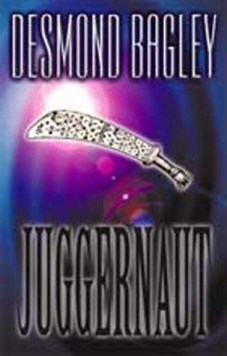
A huge rig is being carried across Nyala to be installed as a power generator. However, the country is in the middle of a war for power, and the crew find themselves in the thick of it. As the war gets worse and more people are taken aboard, the rig itself takes on an almost shrine-like quality to the people of the country, serving as a travelling hospital and a beacon of good luck.
It's a pretty unique story! Since it's basically a big road trip (except with a thousand-ton behemoth on wheels), it's not a constant source of danger and excitement, but the characters always have something to think about - being caught in a political upheaval, they can't exactly move without a plan.
It takes a little while to get going, though. For the first half of the book, the characters only hear about every exciting development, but never actually experience it. From a "show, don't tell" philosophy, it comes across as a bit odd, but by the second half there's a bevy of rip-roaring encounters with the militia.
Although the rig is the backbone of the story that sets everything off, it's the characters that bring it to life. There's a lot of them, and they're all interesting in their own way, even if it can be hard to keep track of everyone. Some are selfish, some are noble, and some have rather sinister backstories. No matter how scummy they are, it's always upsetting to see any of them go.
For all the care it puts into these guys, the ending was a bit disappointing. SPOILER: The rig crashes and is totally destroyed, killing a bunch of the militia in the process, including some of their own men. The heroes are willingly let go by the enemy and can safely get away, but it sounds like a real jam to be in.
... and the book ends there. No epilogue on what happened to them (they hadn't even reached safety yet!), no conclusion on the political ramifications. It just kind of stops.
The "about the author" section mentions Desmond Bagley passed away before finishing the book, and his wife tied it together for publishing. The abrupt ending is about the only indication I had that something was missing; I'm not familiar with his works, so maybe that's customary. Who knows.
That aside, it holds up very well as an entertaining, memorable book. Another great read of the year.
What Katy Did |
by Susan Coolidge Nov |

I read this to keep myself occupied during slow work days. It nearly put me to sleep.
It seems every time I've moved rooms, a collection of Puffin Classics have always appeared on my bookshelves. I don't know how long I've had them for, and I can say with certainty I've only ever read two of them (the two Tom Sawyer adventures). I was hoping to clear out a lot of guff by the end of the year (pfft, like that happened), so I figured, if I don't read these now, when will I ever?
Well, it's a kids book. A little girls' book. It's very sweet, all about the children's adventures and religious life lessons on how suffering in horrible agony for four years can make you a sweet, angelic little person. Katie begins as a rambunctious girl who constantly gets into mischief (and bawling something fierce when she gets reprimanded), but after a visit from her invalid cousin and a mishap on a poorly designed swing, sets about making herself into an upstanding, pleasant, almost motherly figure.
It's a sweet little book. That's about all I can remark on it.
Unnecessary remarks: ... though if I pad this out with a tangentially-related anecdote, we might get somewhere!
There's a bit of god talk in the book, and how pain and love are "the great teachers", or something among those lines. It's not an actively preachy book or anything, it's just a story that happens to be written about religious characters.
Writing this, it got me thinking of a book we were read in primary school. Two siblings were bought a rabbit by their mother, and they were quite chuffed with it. But in the drive home, they got angry over who the rabbit would belong to, and started squabbling. This upset the mother so much THE CAR CRASHED AND EVERYONE DIED.
Swear to god. The book ended with pages reflecting on how this was stupid behaviour and you should love thy neighbour and all that good stuff. I think it tried to pass THE HORRIBLE BURNING TRAVESTY off as a "what not to do" incident and everyone (and the rabbit) lived happily ever after. I'm no teacher, but goddamn, I'm pretty sure there's better ways to get a moral into kids' heads than with a horrible car crash.
Back Spin |
by Harlan Coben Nov |
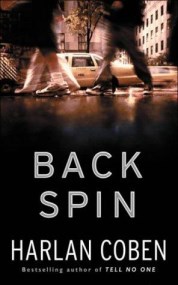
A golf player's prodigy son is kidnapped, so Myron Bolitar, sports agent and private dick, is called in to sniff out some answers.
A very pleasing, easy to read book. An interesting mystery that keeps escalating and throwing twists, but what really sells the book are its entertaining characters. Myron's a wise-cracking sort, keen to crack stupid remarks in the middle of a kidnap-slash-murder plot, and his first-person narration is always light and breezy. Among his comrades are Win, a snooty blueblood with a penchant for violent vigilantism, and Esperanza, his ex-wrestler snarky secretary.
This is the fourth in the series, but there was nothing to put me off as a first-time reader. It establishes some rifts with his partner in crime, Win, presumably from an earlier book, but it's more entertaining filling in the gaps than knowing what happened between them. It's a breezy little read, and very easy to jump into.
The Secret Garden |
by Frances Hodgson Burnett Dec |

Another Puffin Classic to tick off the list. I have memories of seeing the trailer for the 1993 film adaptation on old VHS tapes, but I'd never seen the movie or read the book.
It's a better read than What Katy Did. For starters, it helps that this one has some sort of plot. The little girl is brought to live in this spooky old house, and she slowly comes to learn of all its unsettling elements - the wind, the owner, and of course, the mysterious garden. After she becomes less of a jerk, the focus changes to the ill boy hidden away from the rest of the house, and the kids' ambition to build him into a young and healthy, upstanding individual.
It's unrelated to everything else in the book, but I have to say, the intro feels really strange. So, the little girl is in India with her parents and her servants, right? And then EVERYONE DIES.
Having a character's parents die is an easy way of getting a kid carted off somewhere new in a story, but the entire first chapter is the grisly details of a deadly plague striking down and inciting panic into everyone in a vast Indian palace. It's not gory or grotesque or anything, but it seems so odd narrating this kind of tale, with a chapter's worth of detail, all on something that could easily have been explained in passing. And then the rest of the book is so sweet and gentle you forget all about it. How odd!
The Yorkshire accents are a bit of a nightmare to read, but it's a sweet little book with more intrigue and investment than What Katy Did could muster.